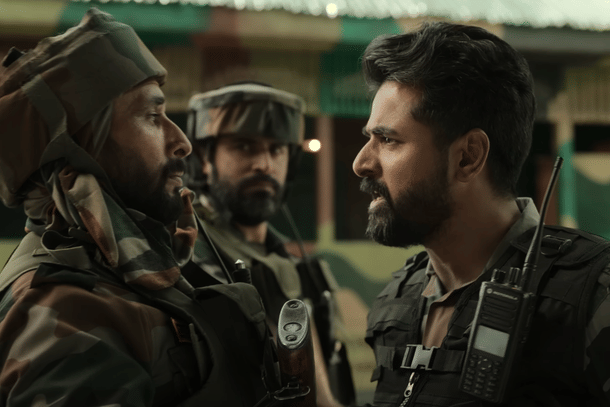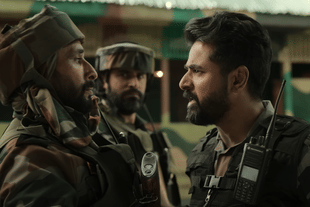Culture
"Amaran" Controversy: How Tamil Nadu Politics Paints National Hero Mukund Varadarajan As A War Criminal
K Balakumar
Nov 14, 2024, 05:52 PM | Updated Nov 15, 2024, 05:51 PM IST
Save & read from anywhere!
Bookmark stories for easy access on any device or the Swarajya app.


It’s not every day that a film faces controversy for being both factual and yet not factual enough.
That is the fate of the Tamil film Amaran, a biopic on martyr Major Mukund Varadarajan, the fourth recipient of the Ashoka Chakra from Tamil Nadu. The braveheart, a Major in the Indian Army's Rajput Regiment, was on deputation to the 44th Rashtriya Rifles battalion in Jammu and Kashmir when he was killed by terrorists in gun-and-grenade combat on 25 April 2014, at the age of 31.
Amaran, produced by Kamal Haasan's Raaj Kamal International, is a story that takes most of its cues from a chapter on Mukund Varadarajan in the book India's Most Fearless: True Stories of Modern Military Heroes by Shiv Aroor and Rahul Singh. The film, directed by Rajkumar Periasamy, is drawing packed houses and incessant controversies from various voices in Tamil Nadu.
The film was always destined to court trouble in some way or the other because Mukund's inspiring story goes against the grain of the narrative being viciously spun in Tamil Nadu these days.
One, he was a Tamil Brahmin by birth, a community that is targeted for vilification, especially in the media and online platforms. Also, he gave his life while fighting terrorists in Kashmir whose religious inclinations are not hard to guess. In the topsy-turvy world of Tamil Nadu though, the on-screen protagonist and antagonist roles are mostly reversed.
In that sense, the fact that the film was made in Tamil to begin with is, in itself, a minor success. Anyway, immediately after the film's release — it hit the cinema halls for Deepavali — the biggest grouse was from the Tamil Brahmin community who felt Mukund's caste identity had been erased (to match the mood of the Dravidians) in the way the story unfolded on screen.
Among their complaints, Mukund calls his father 'Naina' which is not a typical appellation for dads in Brahmin families. This, the Brahmins cried themselves hoarse, was a deliberate effort to hide the fact that he was from their community. The misrepresentation, they alleged, was deliberate. In the clamour of voices was also Mukund's cousin who, in a LinkedIn post, opined that his community details were indeed underplayed, if not wholly brushed aside.
Was His Caste Identity Erased Deliberately?
The director, in his defence, said he followed what Mukund's father had shared, and the screen character was shaped based on his inputs.
The Brahmins were not convinced, focusing on how Mukund’s wife, Indu Rebecca, was portrayed on screen. They pointed to the visible cross in her chain even though in real life there is not much evidence of her sporting such a chain. If the director could provide tell-tale evidence of a person's religion in the passing, can't he show the caste markers for another character?
Of course, the Brahmin community's over-the-top response was more due to what was done in another Tamil biopic earlier. In Soorarai Potru, based on the life and times of G R Gopinath, the man behind India's pioneering budget airline Air Deccan. He was a practising Iyengar in real life, but in the movie, he was projected as some sort of EVR evangelist. It was not only intellectually shallow but downright dishonest.
In general, Tamil filmmakers have a way of caricaturing Brahmin characters on screen. Possibly mortified by those less-than-happy experiences before, some Brahmins vented out their displeasure on social media platforms with typical bombast.
Those who have seen the movie will agree that Mukund's caste identity doesn't come through in the frame, but it also doesn't appear to be a deliberate omission in the story's unfolding. The film is more concerned about the person — a passionate and committed lover of his wife and the soldier — an intrepid warrior who was ready to put himself on the line — that Mukund essentially was. It really comes and is what makes the film tick.
Anyway, in the second week of the film's release, as it is breaking some box-office records, new critics have emerged with newer things to crib about. First up was the Muslim political party, SDPI (Social Democratic Party of India), an ally of the AIADMK in Tamil Nadu, taking exception claiming that the film depicted Muslims as terrorists and that the Kashmir issue was dealt with without nuance.
The Memory Of A National Hero Tarnished
Of course, the film doesn’t delve into the politics of Kashmir, as its focus is solely on Mukund. However, theatres in Tamil Nadu had to be provided with security lest they were attacked by SDPI supporters. It was disheartening to see a legitimate film about one of India’s heroes running in theatres under police protection.
The protests also saw effigies being burnt, not of the director or even the hero, but of producer Kamal Haasan. The SDPI's target was him alone. No prizes for guessing why. Despite his posturing as a Dravidian, Kamal will always be seen as a Brahmin. This is the only truth of Tamil Nadu politics: no matter who you are, if you're born into a Brahmin family, that identity will eventually be used against you.
The controversy surrounding Amaran has been further stoked by Thirumurugan Gandhi, a rabble-rouser with typical godless tendencies. He first attacked the film for depicting soldiers chanting the slogan "Bajrangbali ki Jai.” This, he declaimed, was a manifestation of Hindutva politics. Of course, nobody bothered to tell him that it was the war cry of Rashtriya Rifles, the counter-insurgency regiment that Mukund was proudly part of.
Thirumurugan further fumed, suggesting that Mukund might have committed a war crime for killing a terrorist who, in his words, was unarmed. Either he has not seen the film or is just blatantly lying. The scene Thirumurugan refers to shows Mukund shooting Jaish-e-Mohammed's south Kashmir commander, Altaf Baba, after the latter runs out of bullets, contrary to Thirumurugan's misleading claim that Baba was unarmed.
In his eagerness to play his brand of spoilt politics, Thirumurugan is not targeting merely a movie. He is besmirching a true national hero, whose brand of valour is what safeguards India along its vast borders.
The government citation for Mukund's award reads: "During the operation, before attaining martyrdom, Major Mukund displayed exemplary leadership skills, raw courage, planning and swift action, which culminated in the elimination of the three top-ranked Hizbul Mujahideen terrorists."
It is this man who is being suggested as a war criminal. Hey Ram!





